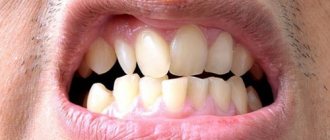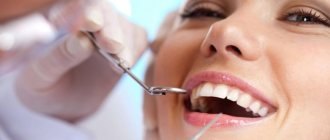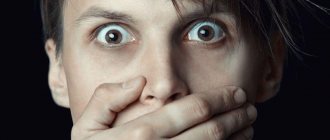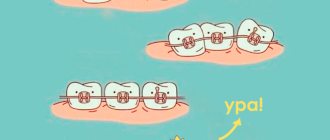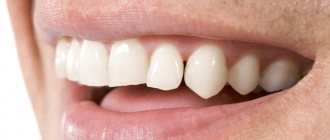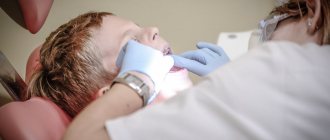Itchy teeth - how does it manifest itself? Possible causes of this symptom and options for its elimination
Often, patients turn to dentists with a rather strange complaint - itchy teeth. Most often, a person has no idea what this symptom is or why it appeared. As a rule, such itching indicates the development of some pathological process, so first you need to find out its cause and only then begin the appropriate treatment. In children, a similar symptom may indicate that the process of teething has begun; in adults, it more often signals the onset of inflammatory processes in soft or hard tissues. Read more about why your teeth may itch and what to do about it.
Scratching teeth in children
When teething, the baby's gums begin to itch. Itching is accompanied by swelling of the gums, which can change color to purple. Teething often occurs at elevated temperatures, which only worsens the overall health of the child.
In school-age children, when their primary bite begins to change to a permanent one, their gums may begin to itch intensely. During adolescence, teeth may begin to itch if the teenager has braces installed on his teeth. In adults, tooth scratching can be caused by smoking or dental disease.
What sensations arise when they say – teeth itch?
Dentists are often contacted complaining of strange and not very pleasant sensations. Patients describe them as follows: the teeth seem to itch and itch. But in fact, such symptoms can be provoked by a variety of pathological processes. For example, sometimes similar sensations occur when inflammation develops in nearby soft or hard tissues.
Strange and not very pleasant sensations arise
And after removal, injured tissue may itch slightly while the process of restoration and healing takes place. When a similar symptom occurs in children, it may indicate the eruption of primary or permanent incisors and molars.
Possible causes of itching
Obviously, there are many potential reasons for this phenomenon. Some patients are bothered by itching in a limited localization on the gum or oral mucosa, others complain that the entire gum itches. To understand what triggered the symptom, you definitely need to visit a doctor.
Manifestation of an allergic reaction
Hygiene products, that is, toothpastes and mouthwashes with flavors and preservatives, can act as allergens. A similar reaction can also be provoked by an ointment applied to the mucous membrane, including a means to improve the fixation of the prosthesis. Allergies are sometimes provoked by the dentures themselves, or rather by the materials from which they are made - acrylic with toxic monomers in its composition or nylon. The cause of itching in the gums may be an allergy, for example, to metal braces.
“When my allergy started after the installation of an acrylic prosthesis, my gums began to itch so much that it seemed like the remaining teeth were itching. There were very unpleasant pulling sensations. Then I immediately went to the doctor, he told me to take off this prosthesis and need to make a new one. When the mucous membrane gives an allergic reaction, you will immediately understand it; you won’t confuse it with anything else.”
Evgeny V.D., from correspondence on the forum www.32top.ru
The cause of itching in the gums may be an allergy.
When an allergic reaction develops, other symptoms are usually associated, for example, swelling, redness, and soreness. In such a situation, it is better to take an antihistamine and avoid direct contact with the allergen. To prevent more serious consequences, you should seek help from a specialist.
Diseases of the oral mucosa
Quite severe itching often occurs against the background of certain diseases of the mucous membrane. Experts in the field of periodontology include the following diseases as such pathologies:
- periodontitis and periodontal disease – inflammation and destruction of periodontal tissue and ligamentous apparatus, leading to loosening and tooth loss. According to statistics, patients with similar diagnoses in almost 15% of cases cite unpleasant itching in the gums as one of the disturbing symptoms1,
- gingivitis is an inflammation of the gum tissue, including the areas between the teeth (gingival papillae), which causes redness, soreness and bleeding,
- stomatitis - inflammation of the oral mucosa, which is characterized by the appearance of painful and itchy ulcers,
- leukoplakia - thickening and keratinization of the upper layer of epithelial cells, in which the affected areas acquire a whitish or grayish tint, and the patient experiences obvious discomfort, burning and itching,
- candidiasis is a bacterial infection caused by the uncontrolled proliferation of a fungus of the genus Candida, which leads to the formation of a dense, indelible coating on the tongue and mucosal surface, as well as the appearance of characteristic symptoms, including itching.
The cause of the appearance of characteristic symptoms can be stomatitis.
These are only the most common diagnoses made in periodontology. The symptoms of many diseases are similar, so to clarify the cause, you must consult a doctor and undergo an appropriate examination. In addition to a visual examination, radiography may also be required, including an orthopantomogram, as well as an oral smear.
Acute deficiency of vitamins and important microelements
If the body does not receive enough vital microelements, vitamin C and zinc deficiency may develop over time. The lack of these substances most often affects the condition of the gums, in particular, it leads to the fact that the mucous tissues weaken, become more friable, itching and bleeding occur. In advanced cases, teeth become loose and even fall out.
Nervous system disorders
Often similar sensations arise due to nervousness. Constant stress and anxiety or sudden mental shocks - all this affects the physiology of the body. The oral mucosa is also affected. Often, against the background of nervous system disorders, inflammatory diseases develop, for example, aphthous stomatitis.
Stress has a detrimental effect on health
Dental diseases
When the front or chewing teeth begin to itch, this may indicate the development of dental diseases. Experts include the following pathological phenomena as possible prerequisites:
- abundant accumulations of plaque and subgingival deposits as a result of insufficient hygiene or disturbances in the gastrointestinal tract, endocrine system,
- bruxism or involuntary clenching of the jaws during sleep, leading to pathological abrasion of the enamel,
- initial caries or sluggish pulpitis can provoke sensations reminiscent of unpleasant itching within the affected area.
Abundant accumulations of plaque and subgingival deposits can also cause itching.
Similar symptoms in some situations appear after an extraction procedure or poor quality dental treatment. In the second case, itching signals the possible development of complications - you need to consult a doctor again.
Other Possible Prerequisites
As for what else can cause your teeth to itch, you can also consider this symptom as a secondary manifestation of other pathological processes occurring in the body. In some cases, itching occurs due to colds, including the flu. It must be said that injury to the mucous membrane can lead to a similar clinical picture. To understand exactly what itching in teeth means, you should consult a doctor.
What is a sign if your teeth itch?
Itchy teeth are a fantasy, because it is believed that bone structures cannot itch (dental tissue is almost devoid of nerve endings). Most often, people only think it is. However, sometimes the itching sensations are so realistic and tangible that some superstitious individuals attach special magical meaning to them. They see in these symptoms signs sent by Higher powers as a prediction of favorable changes in fate or a warning against possible mistakes.
The feeling of itchy teeth can be unbearable
What is the sign if a man’s tooth itches?
The most common superstition regarding unbearably itchy teeth in men says that you should prepare for the appearance of unpleasant gossip and rumors. Information disseminated by others will have an extremely detrimental effect on a man’s reputation. You must be careful and cautious, avoiding rash steps. You need to be especially careful when sharing confidential information with friendly people, because sometimes they turn out to be enemies.
Another sign, if the tooth itches, interprets it differently. The unusual sensations that arise foreshadow radical and global changes in fate. You have to completely change your entire way of life, as well as part with some long-term habits. There may be a change of job and the loss of loyal friends. But they will definitely be replaced by something new and unknown.
What is the sign if a girl’s tooth itches?
When a girl's teeth itch, the omen promises her a date. Moreover, it is absolutely not necessary that this will be a fateful meeting or a love rendezvous. Just friendly, non-binding get-togethers or a bachelorette party are possible. Itching in the jaw area may indicate condemnation from some ill-wisher. You need to be on your guard and pay attention to this sign of fate, since the personality of the enemy will remain in the shadows.
Important! Some people have dreams that their teeth itch. Such disturbing dreams indicate long-held irritation. Constantly suppressing your own emotions will inevitably have a negative impact not only on your health, but also on your general state of affairs.
“Age-related” features of symptom manifestation
Teeth can begin to itch at any age, but in different situations this will be the result of different preconditions. Below are clinical cases that occur more often in a certain age range.
Itching in childhood
Many parents are interested in the question of whether a small child’s teeth or gums, that is, still a baby, can itch. That's right, this symptom occurs against the background of the eruption of primary incisors. During this period, babies usually become capricious and cry a lot, putting any rattles or fingers into their mouths. The beginning of the process can also be noticed by external signs: the gums swell a little, turn red or even turn blue if a small bruise appears. Later, a white stripe appears when the tooth has already broken through the thickness of the gum.
In infants, this symptom may occur during teething.
Older children may also complain of similar symptoms. And in this case, they usually indicate the beginning of a change in bite. During this period, it is important to regularly bring the child for preventive examinations so that a specialist, if necessary, can recognize abnormalities in time and begin appropriate treatment.
When does the symptom appear in adolescents?
If a teenager complains of similar symptoms, this may indicate the development of some pathological processes. This requires diagnosis by a doctor, because the cause is often hidden inflammation inside the tooth or gum tissue, and then the sooner treatment begins, the faster the problem can be solved with minimal risk of complications. By the way, itching often occurs against the background of bite correction with braces. Similar sensations may occur immediately after installation of the system or correction of the arc tension force.
Often itching occurs during bite correction with braces.
As an adult
In an adult, symptoms can be triggered by smoking, drinking low-quality alcoholic beverages, or an allergic reaction to the material of a filling, crown or prosthesis. Sometimes such symptoms are caused by inflammation in the gums and mucous membranes, including gingivitis, periodontitis, glossitis or stomatitis.
Often such a reaction is caused by neuralgic disorders, which, by the way, include bruxism. Constant trauma to the mucous membrane from protruding parts of an incorrectly fitted prosthesis, poorly installed crown or filling also provokes similar sensations of discomfort.
Bruxism is also a cause of the problem
Why does an adult’s teeth itch and what could it mean?
A fairly common complaint in the dentist’s chair is that an adult’s teeth itch. A person does not always know what this means and why it happens. You need to consult a doctor in time and start treating the pathological process that caused such a symptom.
After all, if in children this most often indicates the eruption of teeth, then in a more mature age the cause of this is diseases of soft or hard tissues. The specialist will prescribe treatment that can not only relieve unpleasant symptoms, but also eliminate the underlying pathology.
Causes
The feeling that your teeth itch or your gums itch does not always accurately indicate why this happened. The factors that cause such manifestations can be very different - from poor hygiene to serious pathologies of soft or hard tissues. Therefore, try to get an appointment with a dentist as early as possible, who, after an examination and some tests, will be able to draw objective conclusions and prescribe treatment.
There can be many reasons that cause such feelings. Doctors highlight the most popular among them:
- With periodontal disease, metabolism in soft tissues is disrupted and blood microcirculation deteriorates. In advanced cases, the roots of the teeth are exposed and they fall out.
- As a consequence of serious diseases of internal organs and systems. Such a symptom may be a sign of hormonal or endocrine disorders, liver cirrhosis, or atherosclerosis.
- Poor oral hygiene leads to excessive accumulation of pathogenic microorganisms on the surface of the enamel. Untimely removal of food debris, especially after eating sugar-containing foods, leads to active growth of bacteria.
- Also, such phenomena can be a consequence of diabetes mellitus. Then the person is also bothered by bad breath, purulent discharge from periodontal pockets, and in severe cases it all ends with damage to the bone tissue.
- Gingivitis leads to reddening and bleeding gums.
- Allergic reaction to food or hygiene products used.
- A deficiency of vitamin C or other microelements important for the body leads to serious disorders, including scurvy.
- Smoking is a fairly common cause of many dental problems. In this case, not only the soft tissues itch, but also heavy plaque, tartar, and gums begin to bleed.
- As a result of prolonged stress, neurosis, mental problems. In this case, the body reacts with various inflammatory processes.
- After the installation of dentures, crowns, implants and other dental products, an allergic reaction to metals or other substances in their composition may occur.
- The soft tissues in the mouth are often affected by fungal diseases. The most common among them is candidiasis (thrush). In addition to itching of the gums, it is accompanied by a white coating and other unpleasant formations on the mucous membrane.
- Stomatitis can also cause your teeth to feel itchy. But at the same time, the infectious disease is accompanied by a number of symptoms - increased body temperature, redness, rashes in the mouth, and the formation of ulcers.
- Sometimes itching of the gums occurs during the period of acute respiratory viral infection or influenza. This occurs because the soft tissues in the mouth become swollen and inflamed.
- In some cases, such unpleasant signs indicate leukoplakia and other conditions that precede cancer. Serious disturbances of the bacterial microflora of the oral cavity lead to whitish spots on the mucous membrane and other manifestations.
- After medical manipulations with mistakes. It happens that when a tooth is removed or filled, the nerve is damaged or the seal of the filling is broken. Also, itching of the gums may indicate that some particles remain in the soft tissues after extraction.
Associated symptoms
Most often, if a person complains to the doctor about itchy teeth, then he is also worried about other problems:
- bleeding during hygiene procedures;
- redness or bluish discoloration of soft tissues;
- swelling, increased gum volume;
- unpleasant odor;
- loosening of healthy units;
- exposure of roots;
- purulent discharge from periodontal pockets.
Treatment
It is advisable to pay attention to such symptoms and come for a consultation with a dentist in time. After all, some of these signs indicate cancer in the deep tissues of the oral cavity. And the sooner you start therapy, the higher the chances of completely getting rid of the pathology.
Medicines
Modern pharmaceuticals offer a wide variety of effective medicines:
- Antihistamines for allergic reactions. But in order to get rid of itchy gums for a long period, you must first identify the allergen itself and eliminate it.
- If you have problems with the nervous system and exhaustion of the body as a result of prolonged stress, you need to use sedatives.
- For fungal infections of the mucous membrane, antiseptic solutions and special antifungal drugs are prescribed.
- If herpes stomatitis is diagnosed, then you will have to use antiviral medications.
- In cases of inflammation of the gums (gingivitis, periodontitis), you need to thoroughly clean the tooth surfaces from plaque, stone, food debris, and remove purulent formations, if any. And only after professional cleaning can you begin local treatment with antiseptic drugs and non-steroidal agents.
- If your teeth itch and this is a consequence of internal diseases or acute respiratory viral infections, then the main focus of the pathology is affected. Only after its treatment can one expect that the inflammatory process in the gums will end on its own.
- In case of severe itching, you can use additional means - gels and ointments that relieve swelling and inflammation. Sometimes they also act as an anesthetic. The most popular and effective in dental practice are Cholisal, Metrogyl denta, Solcoseryl, Dental.
Folk remedies
Our people often resort to the use of well-known herbal decoctions, tinctures and other methods that have proven themselves in ancient times, when medicine was not so developed.
The most effective recipes for gum problems are:
- Add 2 tbsp to half a liter of boiling water. l. oak bark and cook over low heat for about 10 minutes. Then the broth is allowed to brew and cool, and filtered before use. It is enough to rinse your mouth with this product three times a day. This substance has an astringent effect, but can form a dark film on the enamel.
- Pour 1 tbsp with a glass of boiling water. l. marigold flowers. Infuse, strain and rinse your mouth until the unpleasant symptoms disappear completely. This plant has medicinal properties and has a beneficial effect on soft tissues and mucous membranes.
- Boil 2 tbsp in 500 ml of water. l. yarrow. After the broth has cooled, it is filtered and used as a rinse. Can be used for seven days in a row. But you should be careful with this medicinal plant in case of pregnancy, high blood clotting rates and low blood pressure, as it has some side effects.
- It is also recommended to rinse your mouth with a solution of sea salt or 6% hydrogen peroxide.
Video: what to do if your gums hurt?
Prevention
To prevent possible dental problems, doctors recommend adhering to the following rules on an ongoing basis:
- Rinse regularly with clean water, special oral care products or herbal decoctions. This is especially important to do after each meal.
- Brush your teeth twice a day, remove plaque from your tongue and the inside of your cheeks.
- Use only high-quality toothbrushes and toothpastes for this.
- Vary your diet with firm and fresh fruits and vegetables.
- Try to consume sugar-containing foods as little as possible.
- Avoid mechanical injuries to soft tissues.
- Have your teeth examined and professionally cleaned by your dentist periodically.
Sources: https://anzub.ru/novosti/cheshutsya-zuby/ https://infozuby.ru/cheshutsya-zuby-u-vzroslogo.html https://pcvoice.ru/lekarstva/ketorol-zubnoy-boli
Itchy teeth during pregnancy
In a girl during pregnancy, the cause of itching may lie in inflammation of the gums - gingivitis is considered a frequent companion of expectant mothers during pregnancy. Also, due to serious changes in the hormonal background, there is an intensive leaching of calcium from the body, which causes the enamel and hard tissues to weaken, and hyperesthesia develops. Itching sometimes has neuralgic background and can be a consequence of the development of dental diseases such as caries, pulpitis, stomatitis or, for example, periodontitis.
During pregnancy, there can be many causes of symptoms
How to get rid of a symptom
If this is a mild discomfort caused by accidental injury to soft tissues, you can rinse your mouth with an antiseptic (Chlorhexidine or soda-saline solution) and in the near future try to avoid too intense mechanical impact on the injured area. If the symptom is in no way related to damage to the mucous membrane, and the discomfort only intensifies, you should see a dentist as soon as possible for a consultation.
Drug therapy
Taking any medications is permitted only as prescribed by a doctor. Remember that independent attempts to solve the problem without the participation of a specialized specialist often lead to a worsening of the condition and the addition of dangerous complications. As part of the symptomatic treatment of itching, drugs of the following pharmacological groups can be prescribed:
- antibacterial,
- antihistamines,
- anti-inflammatory,
- sedatives,
- multivitamin complexes,
- antifungal, etc.
You should take any medications only as prescribed by a doctor.
Additionally, medications are prescribed for both oral and local use, including ointments and gels for treating affected tissues. Only a qualified doctor can select the optimal set of medications for quick and safe treatment.
What does traditional medicine offer?
If the cause of itching lies in inflammatory processes, decoctions prepared from medicinal plants, such as chamomile, sage or oak bark, can help stop their spread.
Herbal decoctions can be used at home
Another good remedy with a pronounced analgesic and anti-inflammatory effect is a soda-salt solution. You need to thoroughly mix one teaspoon of each substance in a glass of boiled, warm, but not hot water. After this, the product can be used as a mouth rinse. You just need to understand that this is only part of maintenance therapy, but not the main treatment. There is no way to do this without the help of a doctor.
Prevention
To prevent itching of teeth and itching of gums, it is necessary to follow a number of preventive measures:
- brush your teeth correctly and regularly;
- treat teeth in a timely manner;
- strengthen the immune system;
- take vitamin complexes.
Traditional medicine recipes
In cases where teeth begin to itch, traditional medicine suggests:
- Rinse your mouth with a solution of soda or salt. Dissolve a teaspoon of baking soda or table salt in a glass of warm water and rinse your mouth with the resulting solution several times a day.
- Rinse your mouth with a decoction of medicinal herbs: chamomile, sage, or an infusion made from oak bark. Use decoction and infusion for their intended purpose.
Before self-medicating, you should consult a dentist to find out the cause of itching in the gums and scratching of the teeth.
Preventive measures
Itching can develop for various reasons on the upper or lower jaw. However, experts in the field of periodontology have formulated a number of simple universal recommendations, following which you can minimize the risk of developing any dental diseases:
- brush your teeth twice a day, use floss and irrigator to better clean hard-to-reach places, do not forget to rinse your mouth after every meal,
- respond promptly to the appearance of suspicious symptoms in the oral cavity, do not self-medicate, but immediately go to the doctor,
- try to lead a healthy lifestyle, give up smoking and alcohol if possible, eat less sweets, especially before bed, make sure that your diet contains enough foods rich in vitamins and beneficial microelements, including minerals, calcium, fluorine and phosphorus,
- undergo regular preventive examinations at the dentist, as well as twice a year - the procedure of a professional. hygiene for removing plaque and deposits.
If you experience any unpleasant symptoms, you should contact a specialist.
Remember that groundless arrogance in the case of dental diseases often results in very disastrous consequences. Inflammation quite quickly turns into a chronic, completely incurable stage, and neglected caries, pulpitis and periodontitis lead to tooth loss. Therefore, if itching appears, do not wait for the symptom to go away on its own - consult a doctor immediately.
1Gerasimova A.P., Pavlov V.N., Periodontology, 2008.
Bruxism
In some cases, itchy gums are caused by bruxism - teeth grinding, which most often occurs during sleep. In addition to discomfort in the gum area, bruxism can damage tooth enamel and negatively affect the health of the jaw joints. In addition, as a result of excessive stress on the teeth, the gums often begin to recede, exposing the neck and roots of the teeth.
Up to contents
The information in this article is for reference only and does not replace professional advice from a doctor. To make a diagnosis and prescribe treatment, consult a qualified specialist.

